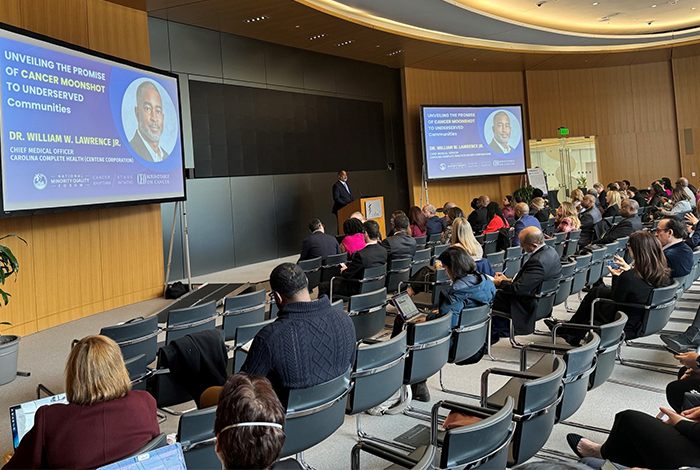Centene Supports Equitable Cancer Care at NMQF Summit
02/05/2024

Each World Cancer Day, the global community imagines a future where preventable cancer deaths are avoided and cancer treatment is truly equitable – and at Centene, we’re working to make that happen by improving access to cancer treatment.
Dr. William Lawrence, Chief Medical Officer of Carolina Complete Health, a Centene subsidiary, joined industry leaders to highlight Centene’s strategies, which include incentives for screening and early detection, at the National Minority Quality Forum’s (NMQF) Cancer Care Equity Summit at the Association of American Medical Colleges in Washington, D.C.
Industry leaders joined together at the event as a united front to bring the Cancer Moonshot – an initiative of President Joe Biden and his wife Dr. Jill Biden aimed at cancer prevention and improved cancer care experiences – to medically under-resourced cancer care communities. The initiative plans to do this by expanding access to screenings, supporting cancer prevention efforts and increasing understanding of environmental exposures linked to cancer.
Under-resourced communities have been found to be at higher risk of getting cancer, with Black Americans more likely to get and to die from colorectal cancer, specifically, than white Americans. At the Summit, Dr. Lawrence explained how Centene is uniquely positioned to help our members in those areas.
“Centene’s core philosophy is that quality healthcare is best delivered locally,” said Lawrence. “This uniquely local approach means that our employees not only live and work in the communities they serve, they also reflect the diversity of the populations we serve. That’s essential to the impact we can have.”
Centene’s health plans were encouraged to focus on colorectal cancer screening even before the National Committee for Quality Assurance included it in their Medicaid health plan rating measure set. Our health plans sent out at-home screening kits and digital messages, and created incentives for members and providers to encourage screening and early detection.
This approach can be life changing for our members, and we’ll continue to push progress in this area so we can achieve our mission of transforming the health of the communities we serve, one person at a time.